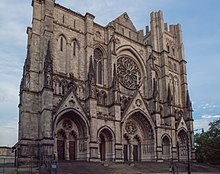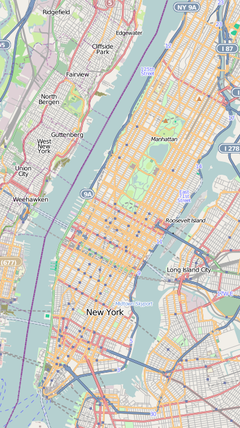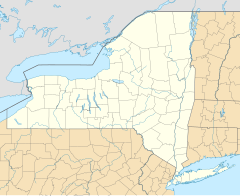| Cathedral of St. John the Divine | |
|---|---|
 The western elevation of the facade, including the rose window | |
| Religion | |
| Affiliation | Episcopal Church |
| District | Episcopal Diocese of New York |
| Patron | John the Evangelist |
| Year consecrated | 1911 |
| Status | Active |
| Location | |
| Location | Manhattan, New York City |
| State | New York |
| Geographic coordinates | 40°48′13″N 73°57′41″W / 40.80361°N 73.96139°W |
| Architecture | |
| Architect(s) | Christopher Grant LaFarge and George Lewis Heins; Ralph Adams Cram |
| Type | Cathedral |
| Style | Romanesque Revival and Gothic Revival |
| Groundbreaking | December 27, 1892 |
| Completed | 1911 (crossing, apse) 1941 (nave) Incomplete (southern transept and towers) |
| Materials | Stone, granite, limestone |
| Official name: Cathedral Church of Saint John the Divine and the Cathedral Close | |
| Type | New York City Landmark |
| Designated | February 21, 2017 |
| Reference no. | 2585[1] |
| Website | |
| StJohnDivine.org | |
The Cathedral of St. John the Divine (sometimes referred to as St. John's and also nicknamed St. John the Unfinished) is the cathedral of the Episcopal Diocese of New York. It is at 1047 Amsterdam Avenue in the Morningside Heights neighborhood of Manhattan in New York City, between West 110th Street (also known as Cathedral Parkway) and West 113th Street.
The cathedral is an unfinished building, with only two-thirds of the proposed building completed, due to several major stylistic changes, work interruptions, and unstable ground on the site. The original design, in the Byzantine Revival and Romanesque Revival styles, began construction in 1892. After the opening of the crossing in 1909, the overall plan was changed to a Gothic Revival design. The completion of the nave was delayed until 1941 due to various funding shortfalls, and little progress has occurred since then, except for an addition to the tower at the nave's southwest corner. After a large fire damaged part of the cathedral in 2001, it was renovated and rededicated in 2008. The towers above the western elevation of the facade, as well as the southern transept and a proposed steeple above the crossing, have not been completed.
Despite being incomplete, the Cathedral of St. John the Divine is the world's fourth-largest church by area and either the largest or second-largest Anglican cathedral.[a] The floor area of St. John's is 121,000 sq ft (11,200 m2), spanning a length of 601 feet (183 m), while the roof height of the nave is 177 feet (54 m). Since the cathedral's interior is so large, it has been used for hundreds of events and art exhibitions. In addition, the Cathedral of St. John the Divine has been involved in various advocacy initiatives throughout its history.
The cathedral close includes numerous buildings: the Leake & Watts Orphan Asylum Building, the cathedral proper, the St. Faith's House, the Choir School, the Deanery, and the Bishop's House. The buildings are designed in several different styles and were built over prolonged periods of construction, with the Leake & Watts Orphan Asylum predating the cathedral itself. The cathedral close was collectively designated an official city landmark by the New York City Landmarks Preservation Commission in 2017.
Cite error: There are <ref group=lower-alpha> tags or {{efn}} templates on this page, but the references will not show without a {{reflist|group=lower-alpha}} template or {{notelist}} template (see the help page).



